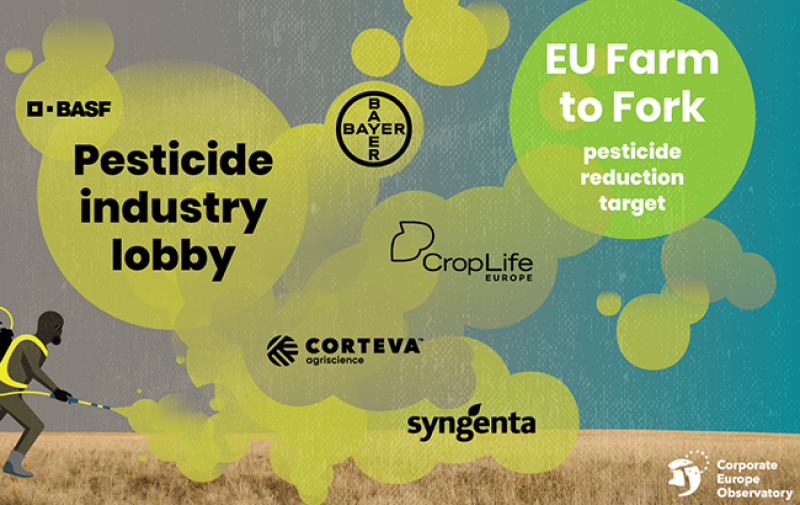
Delay new pesticides law risks derailing Farm to Fork
Civil society organisations deeply regret that the much needed revision of the Sustainable Use of Pesticides Directive (SUD) is being postponed and ask the European Commission to officially present a new publication date within the briefest delays. The publication should take place at the latest by the end of May.
The European Commission was expected to publish the revision today, setting the path for the legal implementation of the Farm to Fork. EU law obliges Member States to reduce the use of pesticides since 2009, but more than a decade later, they still argue against it and attack any EU initiative that would finally get them to respect both the law and science.
The reform of the SUD is of the utmost importance for three interlinked reasons:
- The current EU legislation must be drastically strengthened to ensure Member States finally comply with it and reduce their dependence on the use of synthetic pesticides. As the Court of Auditors,, the European Parliament, and the European Commission have all pointed out, Member States have failed in their obligations with regards to applying the provisions of the SUD.
- Legally binding targets in the use and risk of synthetic pesticides, in line with the Farm to Fork Strategy, and solid indicators to measure progress are needed. Otherwise it will not be possible to achieve the above mentioned objectives.
- EU policy making must be based on the available science showing clear links between pesticide use and severe damage to the environment, biodiversity and human health. Scientific evidence makes strong legally binding reduction targets in the use of synthetic pesticides necessary.
On Monday 21 March, civil society organisations wrote to President von der Leyen, Vice President Timmermans, and Commissioners Wojciechowski, Kyriakides, and Sinkevičius, urging them to present the revision of the SUD, stand by its commitment to the Farm to Fork and Biodiversity Strategies and transition away from our current agricultural model and its reliance on external inputs.
In their letter to European leaders, the groups warned about the lobby tactics of the pesticide industry, the flawed political arguments being used in the debate around the coming piece of legislation and asked for strong legally binding reduction targets in the use of synthetic pesticides. They also reminded that EU institutions and national governments have the responsibility to act in the public interest, not in the interest of the private sector, and that 1,2 million citizens have signed the ECI “Save Bees and Farmers” calling for a phase out of pesticides.
Cynically, the conflict in Ukraine is being instrumentalised by vested interests to get crucial environmental and health commitments off the table. The Commission now appears to be giving in to pressure from French minister Denormandie, Copa-Cogeca, Member States and the EPP, among others. Delaying the revision of the SUD is the wrong policy answer to the current political situation. The terrible situation in Ukraine shows precisely the urgency to make food production less dependent on fossil fuels, pesticides and fertilizers, as pointed out by more than 400 scientists.
Nina Holland, researcher at Corporate Europe Observatory (CEO) said:
"Last Thursday, CEO exposed the immense and well-resourced lobby campaign against the EU Farm to Fork Strategy by pesticide lobby group CropLife Europe and their allies. On the same day, Agriculture commissioner Wojciechowski made statements implying that the Commission may be bowing to industry pressure and delay new pesticide rules. The anti-Farm to Fork lobby will certainly use this extra time to try and further derail the process."
Clara Bourgin, campaigner on food and farming at Friends of the Earth Europe (FoEE) said: “We simply cannot waste anymore time with agribusiness-friendly plans that won't support farmers transition away from toxic pesticide, fertilisers and dirty fossil fuels.The Commission now has the opportunity to implement what citizens are demanding and uphold its commitments for healthy and sustainable food systems.”
Eva Corral, Senior Policy Officer on pesticide and water pollution at the EEB said: “We need a legislative proposal now and a political debate based on evidence. We should not lose time with flawed arguments aimed at delaying any necessary and meaningful political action. It is both possible and necessary to significantly reduce the use of chemical pesticides”
Madeleine Coste, Policy Officer at Slow Food Europe comments: “Nearly two years after the publication of the European Green Deal, we are still waiting to see the Commission’s true commitment to sustainable agriculture in the EU. By delaying the setting of legally-binding pesticide reduction targets, it is jeopardising the EU’s food security it seeks to protect.”
Martin Dermine, Policy officer at PAN Europe: "Postponing the publication of the Sustainable Use Regulation and the Nature Restoration Law is a very negative signal given to EU citizens, especially when no date is proposed. The current crisis is linked to the prices of feed, petrol and synthetic fertilisers: they highlight how vulnerable our model of intensive agriculture is and how dependent the EU is. It confirms we need more Farm to Fork to make our food systems resilient, not less!"
ENDS
